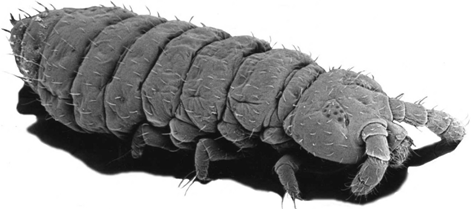
The Sinclair Lab at UWO

 |
Insect Low
Temperature Biology The Sinclair Lab at UWO |
 |
| Jantina
Toxopeus |
|||
| Home People Research Publications Vacancies Links Contact Us Biology Home |
I have a passion for understanding how organisms manage to survive and thrive in all sorts of places, especially in extreme environments. I started my research career studying the contribution of symbiotic fungi to the impressive desiccation tolerance of intertidal brown algae (B.Sc. Hons, St. Francis Xavier University, Antigonish NS), and the role of disordered proteins in the anhydrobiosis of sea monkey (Artemia franciscana) embryos (M.Sc., Dalhousie University, Halifax NS). I currently research the phenomenon of freeze tolerance – the ability of organisms to survive internal ice formation. As a third year Ph.D. student in Dr. Sinclair’s lab at Western University (London ON), I have established that the spring field cricket, Gryllus veletis, undergoes a series of complex changes in metabolite and gene expression patterns in the process of becoming freeze tolerant. I am currently determining the function of metabolites and genes that appear to be important for freeze tolerance, to better understand the molecular and physiological mechanisms underlying the ability to survive internal ice. When I’m not spending quality time with crickets, I also enjoy interacting with humans, and particularly love teaching. I have a Certificate in University Teaching and Learning (Dalhousie University), and currently work for the Teaching Support Centre at Western University, training teaching assistants to be more effective teachers. I strive to incorporate evidence-based teaching methods into my classes, and am conducting a research project that examines how university students structure their knowledge of animal physiology, and how educators can promote improved connections between concepts (more advanced knowledge structures). If you ever want to get in touch with me about my teaching or research, connect with me on ResearchGate or LinkedIn, or check me out on Google Scholar Publications 7. Andrushchenko, I., Taylor, B., Toxopeus, J., Wilson, E. (2016) Congregations of the leaf-shredding insect Lepidostoma togatum mediate exceptionally rapid mass loss from leaf litter in Nova Scotia rivers. Hydrobiologia, doi: 10.1007/s10750-016-3001-6. 6. Toxopeus, J., Lebenzon, J.E., McKinnon, A.H. and Sinclair B.J. (2016) Freeze tolerance of Cyphoderris montrosa (Orthoptera: Prophalangopsidae). The Canadian Entomologist, doi: 10.4039/tce.2016.21. 5. Toxopeus, J., Jakobs, R., Ferguson, L.V., Gariepy, T.D. and Sinclair, B.J. (2016) Reproductive arrest and stress resistance in winter acclimated Drosophila suzukii. Journal of Insect Physiology, 89: 37-51. 4. Toxopeus, J., Warner, A.H., and MacRae, T.H. (2014). Group 1 LEA proteins contribute to the desiccation and freeze tolerance of Artemia franciscana embryos. Cell Stress and Chaperones, 19: 939-948. 3. King, A.M., Toxopeus, J., and MacRae, T.H. (2014) Artemin, a diapause-specific chaperone, contributes to stress tolerance of Artemia cysts and influences their release from females. Journal of Experimental Biology, 217: 1719-1724. 2. King, A.M., Toxopeus, J., and MacRae, T.H. (2013) Functional differentiation of small heat shock proteins in diapause-destined Artemia embryos. FEBS Journal, 280: 4761-4772. 1. Toxopeus, J., Kozera, C.J., O’Leary, S.J.B., and Garbary, D.J. (2011) A reclassification of Mycophycias ascophylli (Ascomycota) based on nuclear large ribosomal subunit DNA sequences. Botanica Marina, 54: 325-334. Conference Presentations (* = presenting author) 7. Toxopeus, J.*, Koštál, V. and Sinclair B.J. (2016) Crickets on ice: dissecting the mechanisms underlying insect freeze tolerance. Canadian Society of Zoologists (CSZ) Annual Meeting, London ON. (poster) Battle Award honourable mention for best student poster 6. Sinclair, BJ*, Toxopeus, J, Jakobs, ., Ferguson, LV and Gariepy, TD (2015) Dissecting the winter morph of Drosophila suzukii. Entomological Society of Canada Annual Meeting, Montreal QC. (oral) 5. Toxopeus, J.*, Jakobs, R., Ferguson, L.V., Gariepy, T.D. and Sinclair, B.J. (2015) Reproductive diapause alters stress tolerance in Drosophila suzukii. Canadian Society of Zoologists (CSZ) Annual Meeting, Calgary AB. (poster) 4. Toxopeus, J.*, Warner, A.H. and MacRae, T.H. (2014) Group 1 Late Embryogenesis Abundant (LEA) proteins enhance desiccation and freeze tolerance of the crustacean, Artemia franciscana. Genomes to/aux Biomes (CSZ Annual Meeting), Montreal QC. (oral) Hoar Award finalist for best student talk 3. King, A.M., Toxopeus, J.* and MacRae, T.H. (2013) Functional differentiation of small heat shock proteins in diapause embryos of Artemia franciscana. International Symposium on the Environmental Physiology of Ectotherms and Plants, London ON. (oral) 2. Toxopeus, J.*, Warner, A.H. and MacRae, T.H. (2013) Life without water: the importance of Late Embryogenesis Abundant (LEA) proteins in a stress-tolerant crustacean. Dalhousie University Patrick Lett Symposium, Halifax NS. (oral) Best Oral Presentation Award winner 1. Toxopeus, J.*, Kozera, C.J., O’Leary, S.J.B. and Garbary, D.J. (2011) Classification of Mycophycias ascophylli, a marine fungus associated with two brown algae. APICS Undergraduate Biology Conference, Halifax NS. (poster) Invited Seminars 1) Toxopeus, J. (April 2016) Uncovering the mechanisms underlying insect freeze tolerance. Czech Academy of Science Biology Centre [Physiology Seminar Series], České Budějovice, Czech Republic. Email me |
 |
|